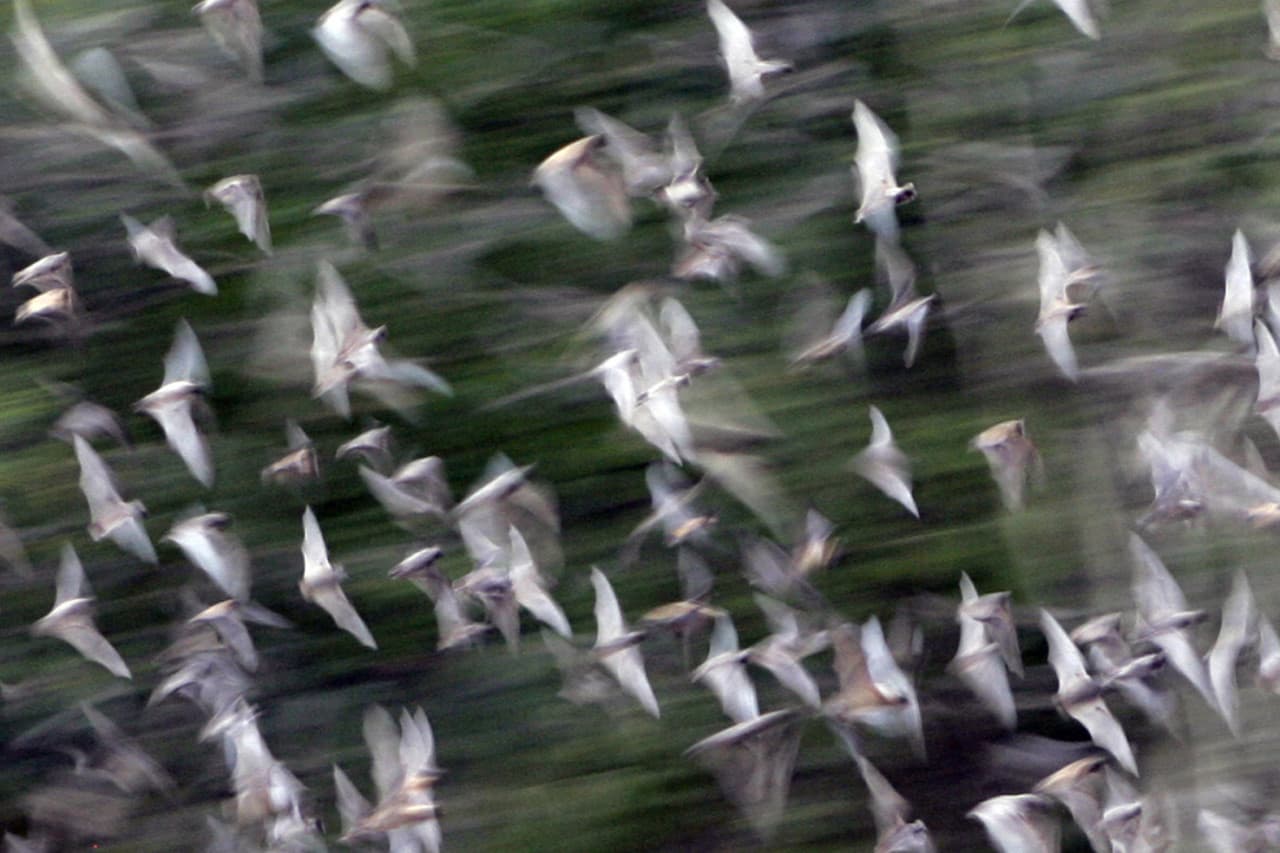Advertisement
How Bats Can Help And Hurt You
ResumeWhat bats can carry when they fly – measles, mumps, SARS, Ebola. We’ll get the latest. Plus: a doctor who survived Ebola tells us why he's headed back to Liberia.

Bats are totally amazing. The only flying mammal. Incredible consumers of insects. They save the crops that feed us. The most attentive parents. Incredible immune systems. Bats are also incredible carriers of diseases that can hit humans. Rabies, of course. But also measles, mumps, SARS, MERS — Ebola. That Ebola piece is getting a lot of attention right now. West Africans being warned not to eat bat soup. But understanding bats may also be a way out of disease. This hour On Point: the world of bats, vulnerability and immunity. Plus, the very latest on Ebola.
-- Tom Ashbrook
Guests
Kevin Olival, senior research scientist with the EcoHealth Alliance. (@nycbat)
Gary McCracken, professor of ecology and evolutionary biology at the University of Tennessee. Member, Board of Directors at Bat Conservation International
From Tom’s Reading List
Bloomberg News: Ebola Clue Lurks in 10 Million Zambian Bats — "While Zambia has no recorded cases of Ebola, the outbreak in west Africa is denting the reputation of bats across the continent. The first person to contract Ebola in its most recent outbreak in west Africa may have been infected by insectivorous free-tailed bats in Guinea, according to a study published on Dec. 29 in the Heidelberg, Germany-based EMBO Molecular Medicine journal. In the West African outbreak the virus has mostly killed people in Guinea, Sierra Leone and Liberia, according to the World Health Organization."
National Geographic: Insect-Eating Bat May Be Origin of Ebola Outbreak, New Study Suggests -- "Ebola virus is a zoonosis, meaning an infectious agent that lives inconspicuously and innocuously within some nonhuman animal (its reservoir host) and spills over occasionally into humans, causing disease. Fruit bats, which are relatively large and meaty, have often been touted as suspects, but the virus’s reservoir host has never been positively identified. The gold standard of proof—culturing live virus from the tissues or blood of a candidate animal—hasn’t ever been achieved from fruit bats, nor from any other creature. So the virus is still at large, its reservoir indeterminate, its whereabouts unknown, somewhere within the landscape of tropical Africa."
TIME: Why Bats Are So Misunderstood -- "It might surprise you that another, equally useful and (to some of us) equally beguiling animal — the bat — has been battling a lethal foe of its own. The clamor to save bats, however, has been rather muted — a lack of attention that remains profoundly frustrating for admirers of the order Chiroptera(from the Greek word for, roughly translated, hand wing)."
After Surviving Ebola, Dr. Richard Sacra Will Return To Liberia
Dr. Richard Sacra, assistant professor of family medicine and community health at the University of Massachusetts's Medical School.
Drew Hinshaw, contributing reporter in West Africa for The Wall Street Journal. (@drewfhinshaw)
The Wall Street Journal: Experts Rush to Find Ebola Treatments in 2015 -- "The National Institutes of Health and GlaxoSmithKline PLC plan to test a vaccine among Liberian health workers. Similar rollouts are being discussed in Sierra Leone. The World Health Organization hopes that work will yield a vaccine in 2015. But no one knows whether the treatment will prove safe and successful, or when it might be ready. Any vaccine would probably be given first to at-risk health workers, pharmaceutical company representatives say, meaning its role ending the broader epidemic would be limited."
This program aired on January 14, 2015.